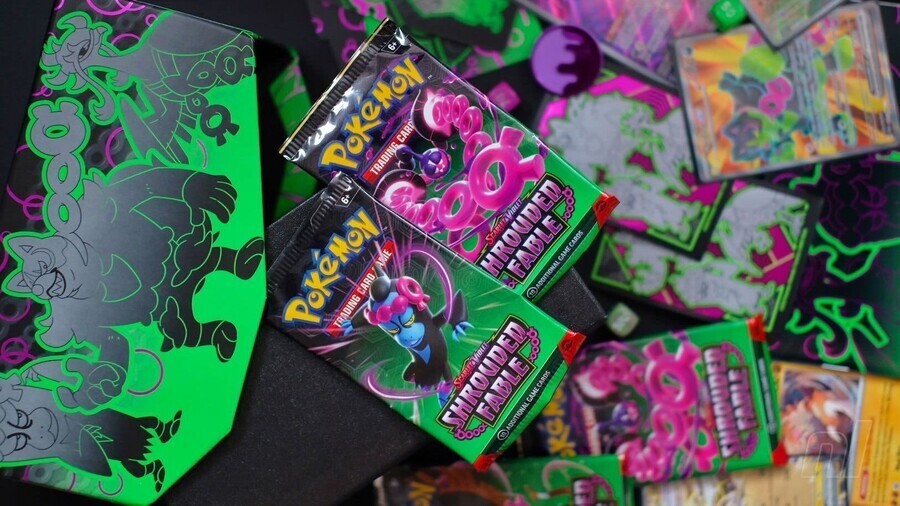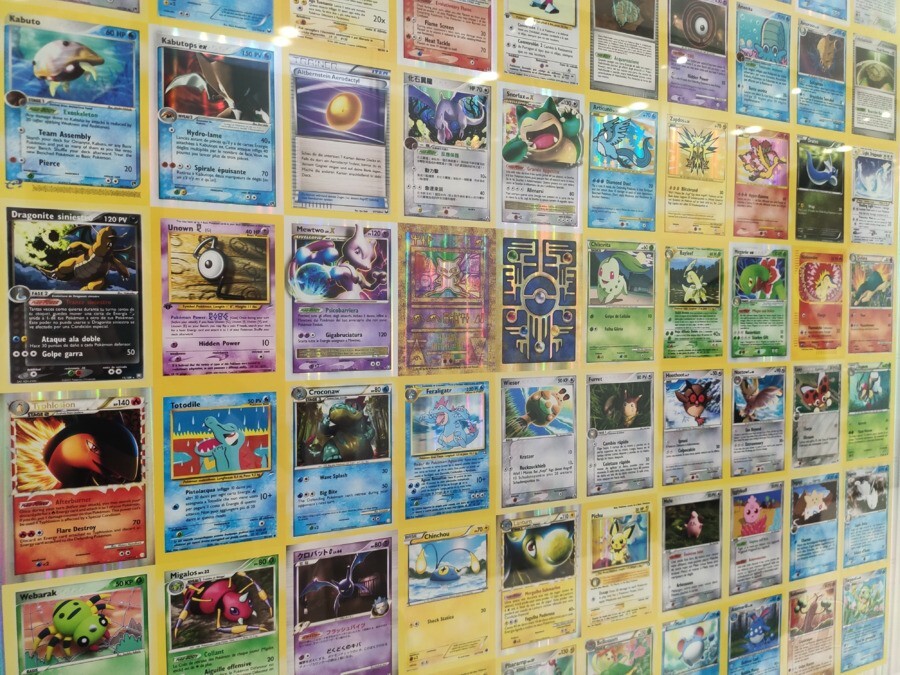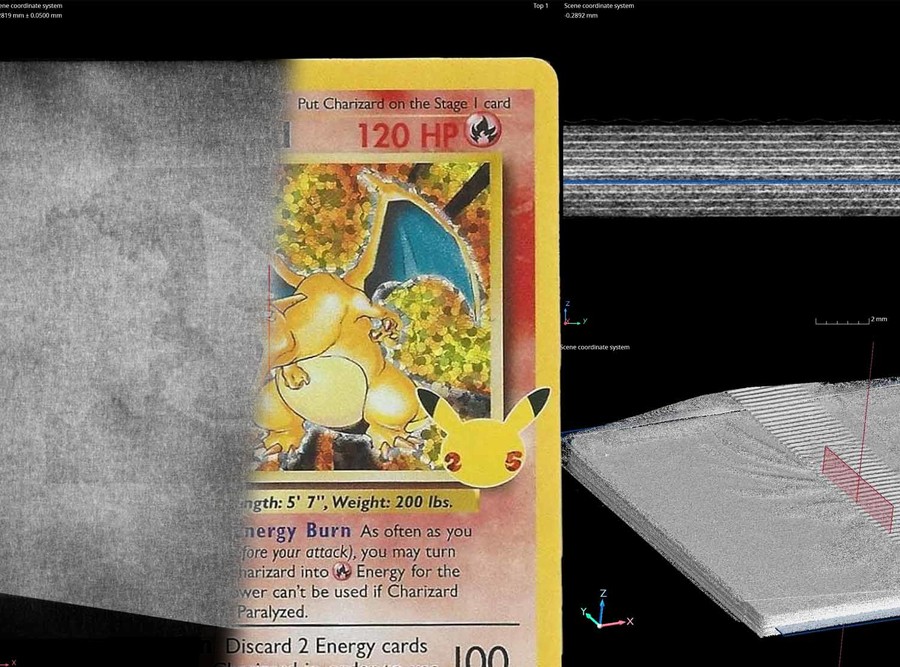
The entirety of the trading card community — that is, people who collect, buy, and sell the Pokémon Trading Card game, sports cards, Magic: The Gathering, Disney, or literally any trading card game you can think of — has gradually become aware of what might be an existential threat to the entire concept of opening up a blind pack of trading cards.
Over the past month or so, a series of events occurred across different corners of the trading card hobby which have snowballed into a panic, all stemming from one unlikely thing: CT scanners. Yes, computed tomography, like the kind of thing doctors typically use to see your insides, has now effectively been demonstrated on trading card packs and boxes to accurately show what’s inside without needing to open them.
Not only that, but in the aftershock of the news, a business named Industrial Inspection + Consulting LLC has already come to market with an attempt to monetize CT scanning trading card boxes and packs, suggesting on its brand new website, “If some people have access to this technology, you should too.”
First, A Loose Timeline of Events
Back on June 24th, 2024, Instagram user Dtaoooooo uploaded what they alleged was a video of a CT scan displaying a box of officially licensed basketball cards, posted with the following caption:

Today, panini’s NBA copyright is about to expire, I hereby disclose a secret that is clear in the blind box industry, so that consumers can see how to ”unbox without damage“ through CT scanner technology, merchants are unscrupulous offline to find logoman‘s speculative way without loss! #logoman @paniniamerica @psacard #logomancard
The X-ray displayed what skilled hobbyists would relatively easily be able to identify as a “Logoman'' card floating inside of a sealed box. That’s an extremely rare, serialised type of trading card that features an NBA patch from a real player’s jersey, even the least valuable of these sell for hundreds, while the rarest sell for thousands.
This Instagram claim raised plenty of eyebrows after it was circulated, but most of the conjecture uneasily concluded this was either fake, or hoped it was too impractical to be of much consequence.
However, a few weeks later on July 16th, 2024, a YouTube channel called “Ahron Wayne's Strange Brain” posted an entirely unrelated vlog on the same topic titled “Digitally Peeking Inside a Pack of Pokemon Cards”. In this far more wholesome yet still astonishing video, Ahron Wayne details how his young career in science eventually led him to an eBay listing for a local pickup of two broken-down CT scanning machines, which in total cost him $1,500.
After using his own technical expertise to fix the machines and initially using them for more typical endeavors, Wayne spends the video explaining an initial curiosity to test their limits before visually detailing his process of scanning 25-year-old vintage Pokémon packs. The result? The machine produced fuzzy yet unmistakable images of holographic hits from inside the packs — packs which still remain unopened.
This video was released in earnest, but the reactions from trading card streamers (if the Youtube videos accompanied by shocked-faced-thumbnails totaling in the dozens are any indication) were cataclysmic. And it’s not hard to imagine why.
What This Means For the Magic, Pokémon, and More

In short, nobody really knows what this means for the hobby for certain, but this is not entirely without precedent.
Historically, within the Pokémon card game but also in others, re-sellers have been able to physically weigh vintage packs in order to identify packs with rarer holographic cards inside of them, with relatively repeatable consistency.
But X-ray vision is an entirely new ballgame that would permanently alter the massive economy of vintage collectibles. Try to imagine the concept of “scanned” versus “unscanned” packs adding and subtracting value to sales listings, or how literally any sealed box of anything would fall suspect to having been pre-scanned for top hits.
Yet just weeks ago, no one could fathom a use case where both industrial machinery and skilled machinist could be paired up for the explicit purpose of finding Charizards. But after someone showed they were able to do it shockingly effectively for a mere $1,500, an amount equal to many run-of-the-mill business expenses, many began to piece together not whether the technology to scan packs was possible or practical, but rather, how long this has already been going on for?
The Company Who Wants To Scan Your Cards
Finally, on June 26th, 2024, a company called Industrial Inspection + Consulting LLC posted a blog post titled “NOW YOU CAN PIKACHU CARDS WITHOUT OPENING THE BOX”.
This post came complete with high-resolution video and detailed imagery of their professional scanning machines scanning shrink-wrapped boxes of Pokémon cards, as well as scanning single cards sandwiched between other cards. From that, the company showed off how it was able to produce strikingly detailed scans of individual cards inside of unopened merchandise, as well as those blocked by other cards.
In response to the tidal wave of reaction within the card community, the company quickly pivoted to produce an e-commerce page, complete with pricing tiers for scanning services wherein you can physically mail unopened packs or boxes of cards in exchange for digital CT scans of your items.
Nintendo Life reached out to Industrial Inspection + Consulting LLC to ask more questions about how their business intends to operate, as well as their opinions on the CT scan phenomenon in general.
[Editor’s Note: Nintendo Life has confirmed the subject’s identity, but has granted their spokesperson anonymity on the basis of continued threats to their workers. While it is not our preference to publish anonymous comments, we ultimately felt it is still valuable to let readers discern the proposed overall viewpoints of the company for themselves.]
Nintendo Life [Alan Lopez]: What does your company do, specifically? And what services do you sell?
Industrial Inspection & Consulting is an engineering support company offering a variety of niche inspection services, including non-destructive testing for X-ray, CT Scanning, 3D Scanning, Reverse Engineering, Metrology, Dye Penetrant, Magnetic Particle, Ultrasonics, and consulting and oversight.
Your website postures Industrial Inspection + Consulting LLC as a response to an unchecked trend of CT scanning trading card packs. Your website reads:
First, we made public what’s been happening in secret. Now we are bringing x-ray vision to the masses.
If you haven’t heard, we are able to identify holographic cards inside unopened card packs. [...] If some people have access to this technology, you should too. It’s what’s fair and the next logical step. How do we know? Because of the explosion of interest we’ve received. Between calls from reporters, endless requests to scan packs and kits from collectors, investors, card stores, and auction houses, and a 28,000% spike in traffic to our website, the demand is clear. That’s why we’ve worked around the clock to develop a reliable method and affordable cost per pack for CT scanning. Pandora’s box is open – jump in.
To your knowledge, what specifically has been happening in the trading card industry, and for how long? And how did you find out?
There is ample evidence, with more being released at a fast pace, that this has been occurring in secret for a long time. From video-based evidence of people attempting it for years, to anecdotes in community comment sections about medical systems being used, it’s been happening likely as long as the technology has been available.
We stumbled upon this [trend] by accident after producing a standard case study on our website. It went relatively viral due to other parties’ reactions who were working on [CT scanning trading cards] in secret, [and then] also releasing their findings.
So do you believe CT scanning is a positive development for the world of collectibles? And why or why not?
We believe CT scanning is an inevitable development.
The technology is not going away, and people know what it can do. To argue if it is positive or negative does not matter because interested parties will find a way to use it regardless of public opinion.
How prevalent do you think CT scanning is in the collectibles economy?
We do not have data for this.
Roughly how many CT companies/services for collectibles exist today? Or rather, what does the privatization landscape of this technology look like right now?
We are the only company offering CT scanning for collectibles to date.
Do you know if there are any safety concerns with CT scanning items, not just for you, but specifically for anyone who might see this and attempt to do this on their own?
We are certified non-destructive testing experts with years of experience handling our equipment and complex projects. We cannot speak to the safety of someone trying this on their own. That is dependent on their expertise and the equipment they use.
As for safety to the general public, X-Rays are non-destructive to inorganic material and they pass harmlessly through objects like this without altering molecular structure. Once exposure is complete, there is no residual radioactivity or damage.

It's clear that by monetizing the issue, your solution appears to be regulation and normalization of the technology. However, one of the biggest challenges to an approach between a private third party and a person with unopened packs is trust; how does a third-party company instill trust in a potential customer that they would both a) receive an accurate assessment and b) actually get back the unopened item that they sent in? Some readers have expressed serious doubts that if their packs had valuable cards in them, that they would actually receive them back.
Product safety is left up to the consumer. When the chain of custody is considered, as soon as that product leaves the user, they are no longer aware of their product. The product must be sealed in tamper-proof packaging. If it is not, the client is then using our services at their own risk with our reputation as collateral. There are endless and customizable product security solutions available online.
And how accurate do you believe the scans to be? Is there a mathematical percentage?
From an accuracy and repeatability standpoint, there is an uncertainty of about 9UM (micrometers) for these scans. From a practical, imaging standpoint, and our ability to witness card characteristics, that is entirely dependent on the type of card and the care the operator uses to evaluate the data.
For example, a Pokémon reverse holographic card can be seen in a scan, but the only way to identify the particular card would be to read the moveset, or by other special markings. There is no character silhouette [in this instance]. Does this mean the scan is inaccurate? No, it means we captured the data available for that type of card. We offer no guarantees beyond what has been demonstrated on our website.
[However], we have received endless requests for products we are unfamiliar with. We will offer our best effort to produce data for these products.
Do you believe that this technology will ultimately become as standard as weighing packs?
This technology will not replace weighing because weighing is cheap, fast, and able to be performed by anybody.

So then, exploring that barrier to entry, are all CT scan machines similarly effective, or is there variance in the technology? What is the current price point of owning and operating one of these machines?
Not all systems are equal; there are low-cost-to-entry systems with results to match (higher noise, diminished resolution, slower processing.) Our systems cost high 6-7 figures each, but with results to match those figures.
Finally, as of this interview, there has been no comment from the makers of these cards. But do you believe that there will be actions taken by Wizards of the Coast, Pokémon Int., Topps, etc, in response to you, or this phenomenon?
We do not know if manufacturers will respond.
This interview has been very lightly edited for clarity.
Nintendo Life has also reached out to The Pokémon Company International, Topps, and Wizards of the Coast, but they did not respond for comment prior to publication. We will update this story if they provide any future comment.



